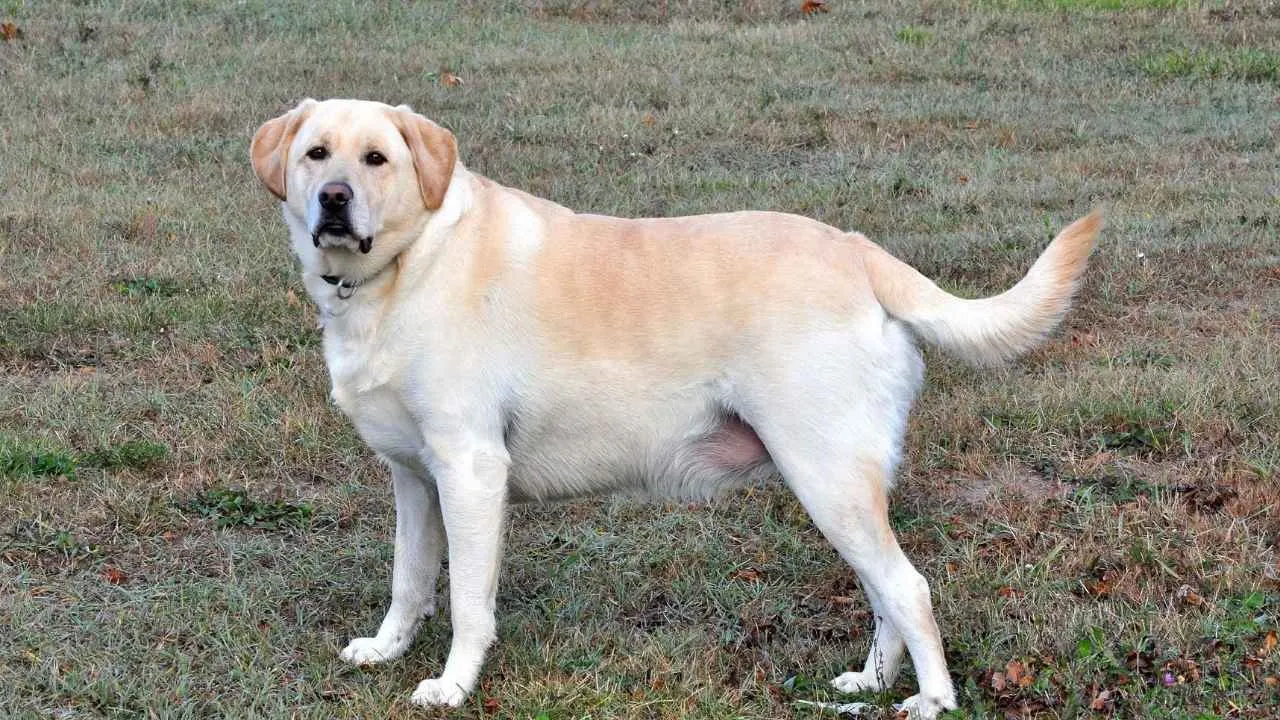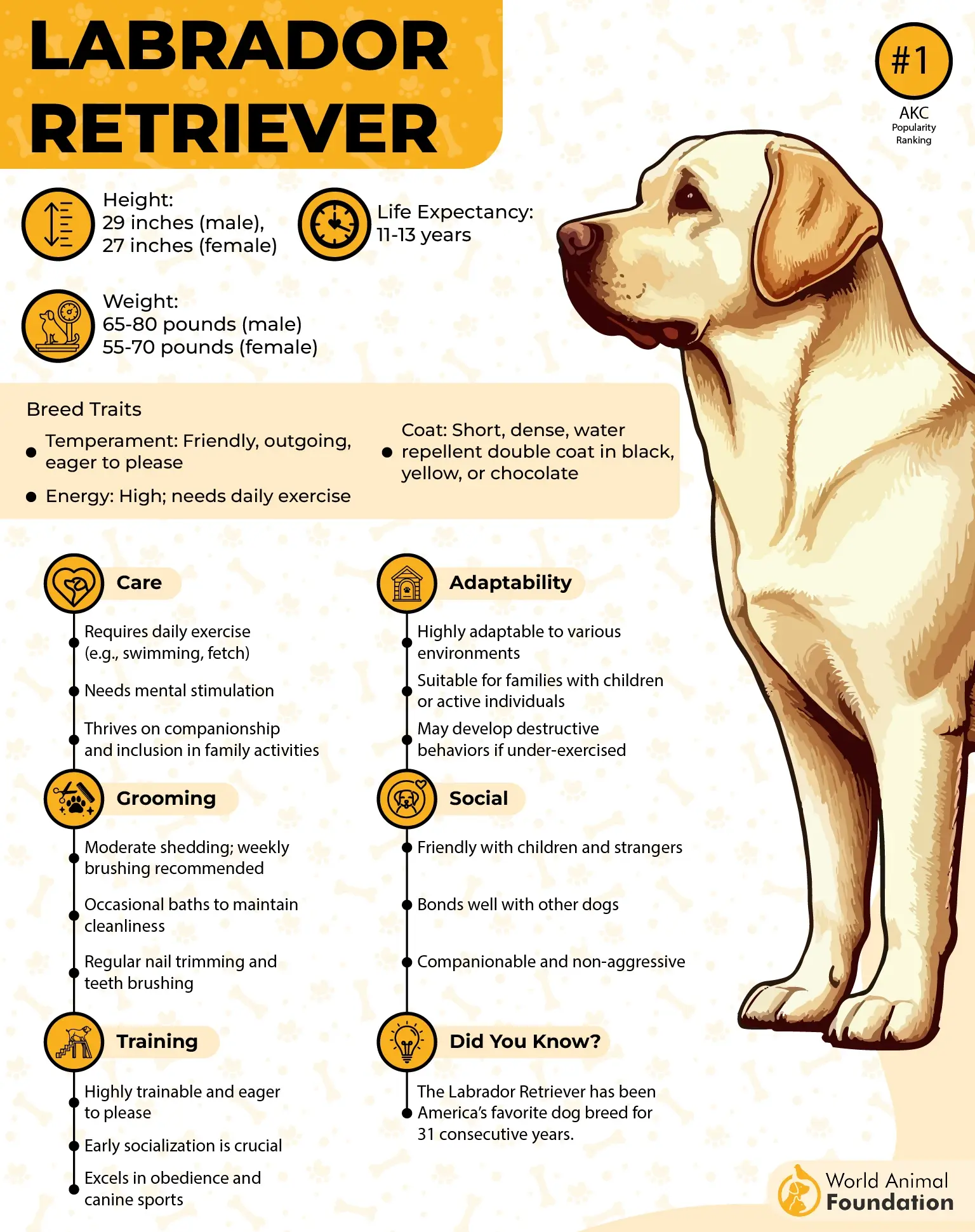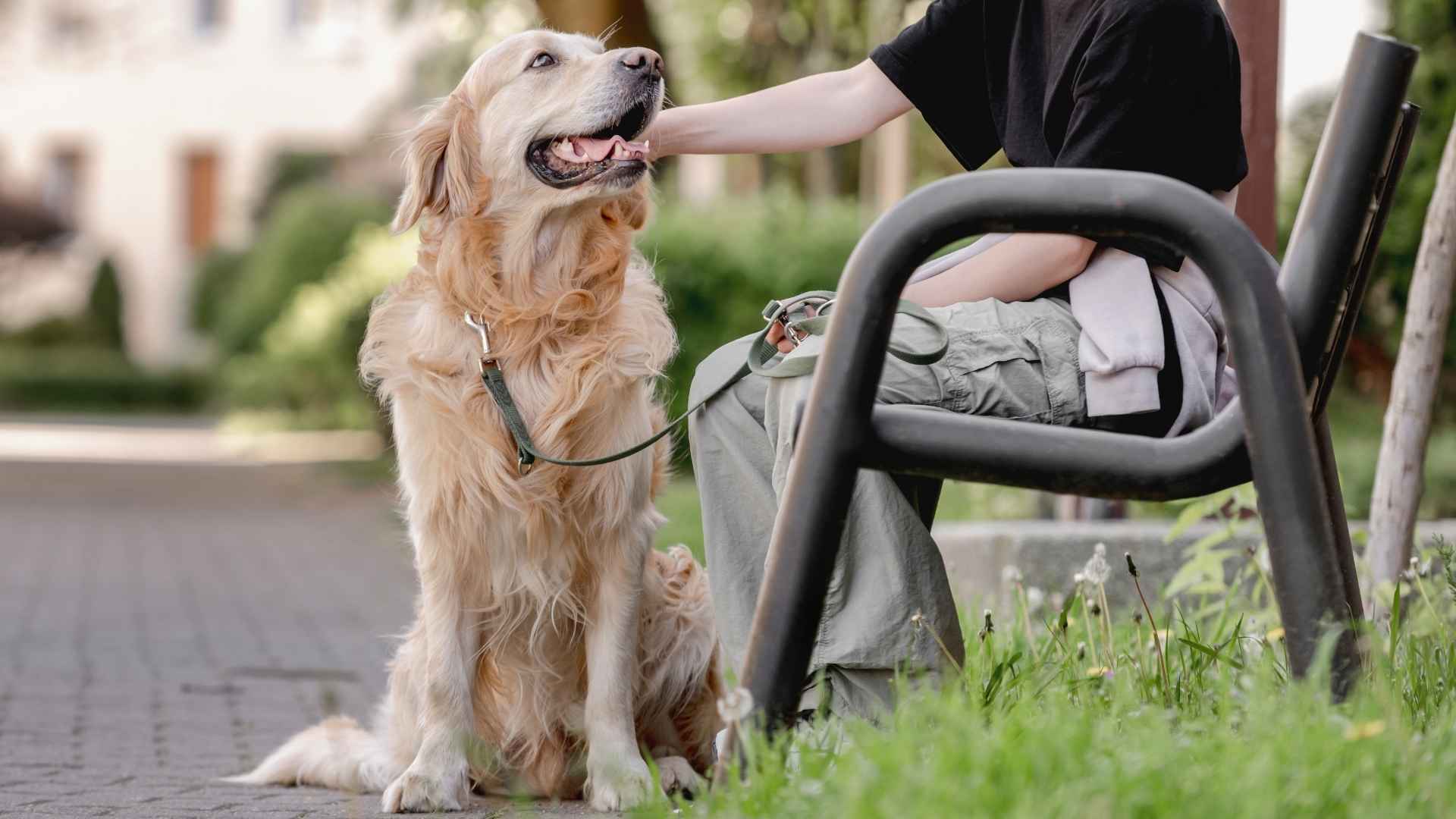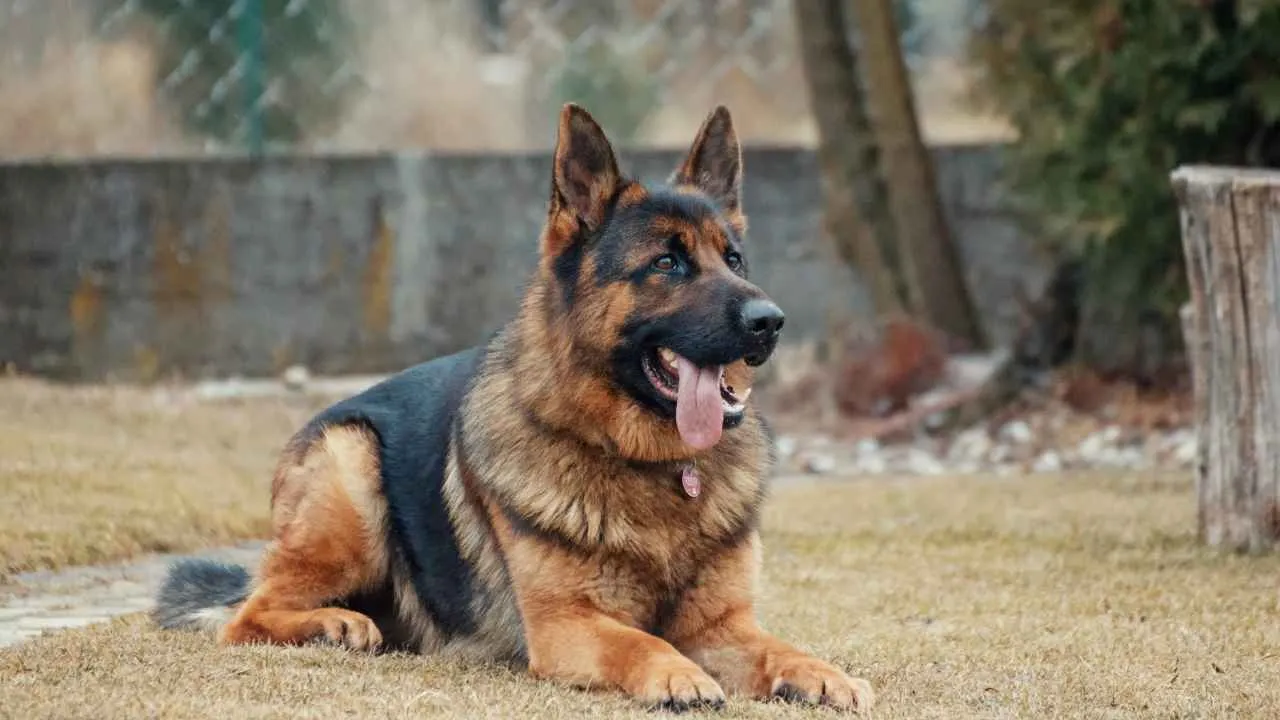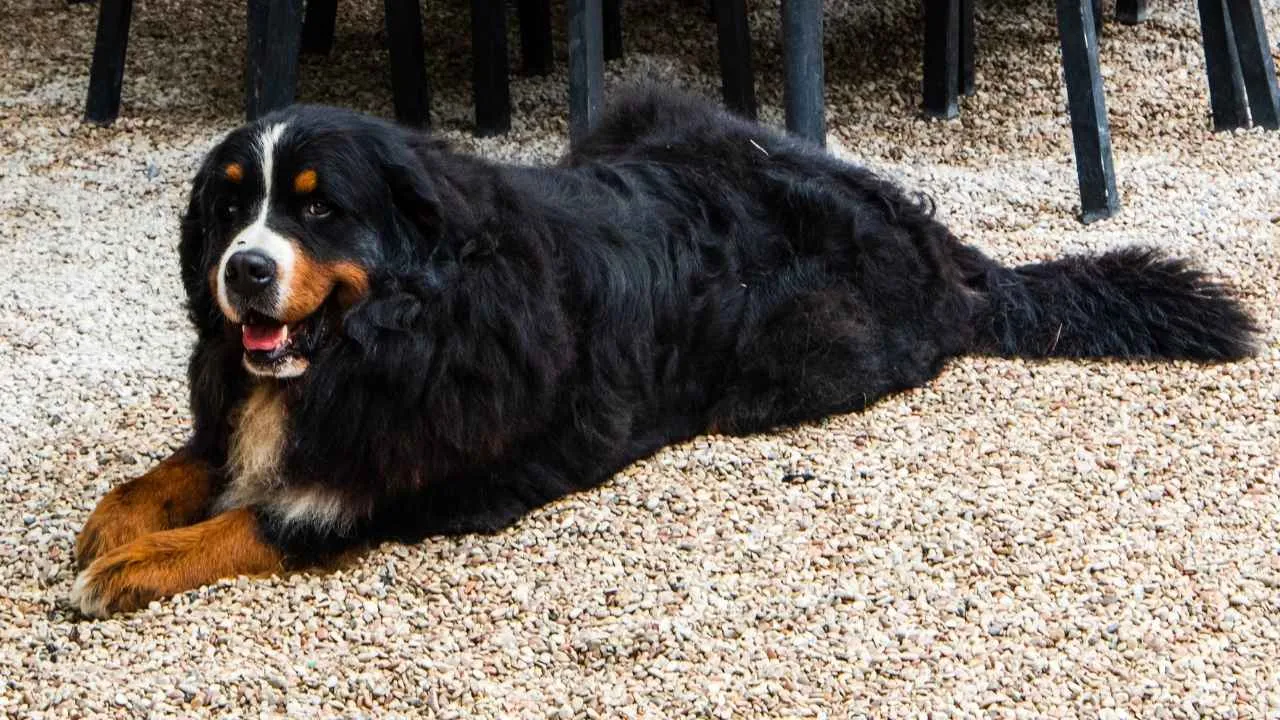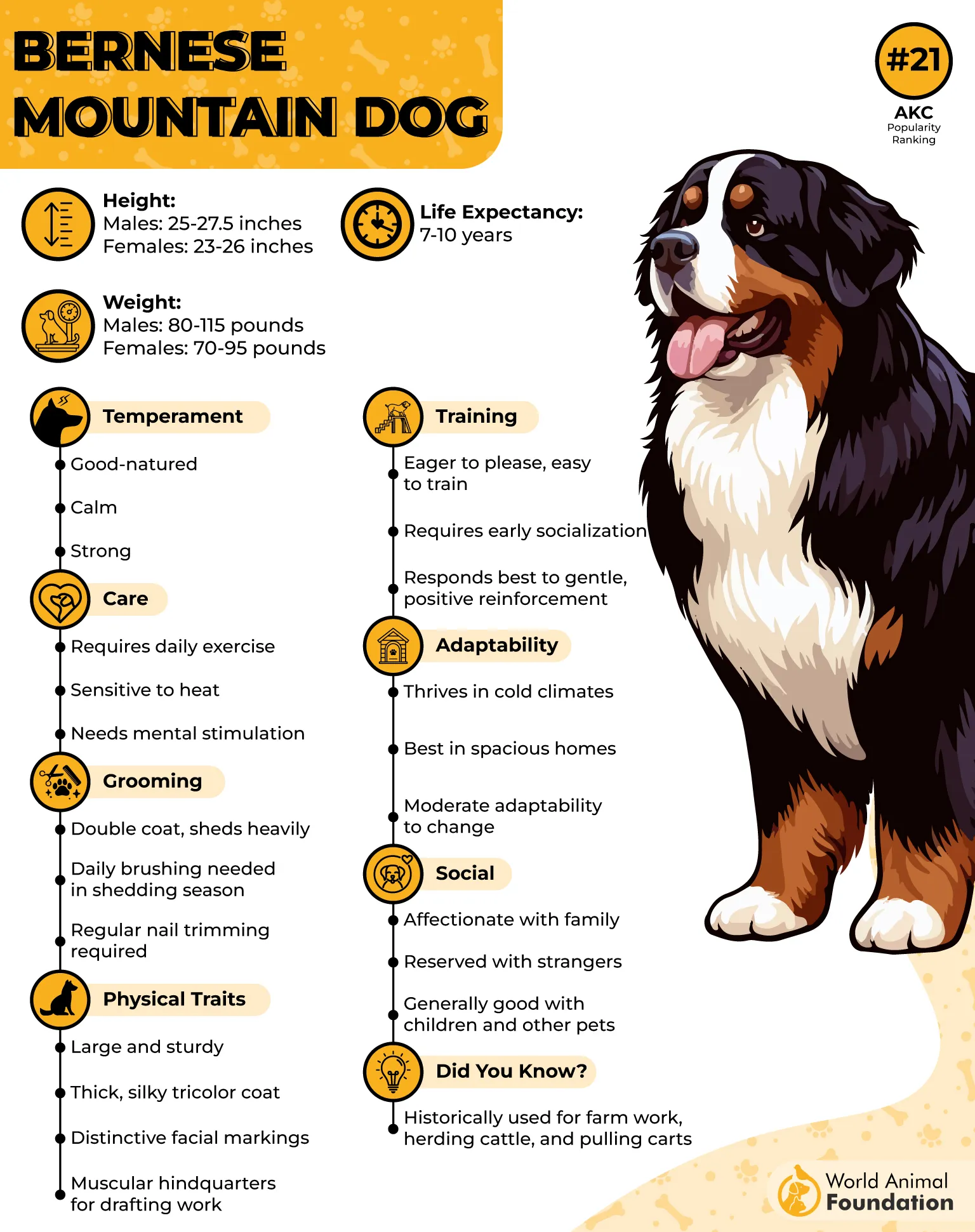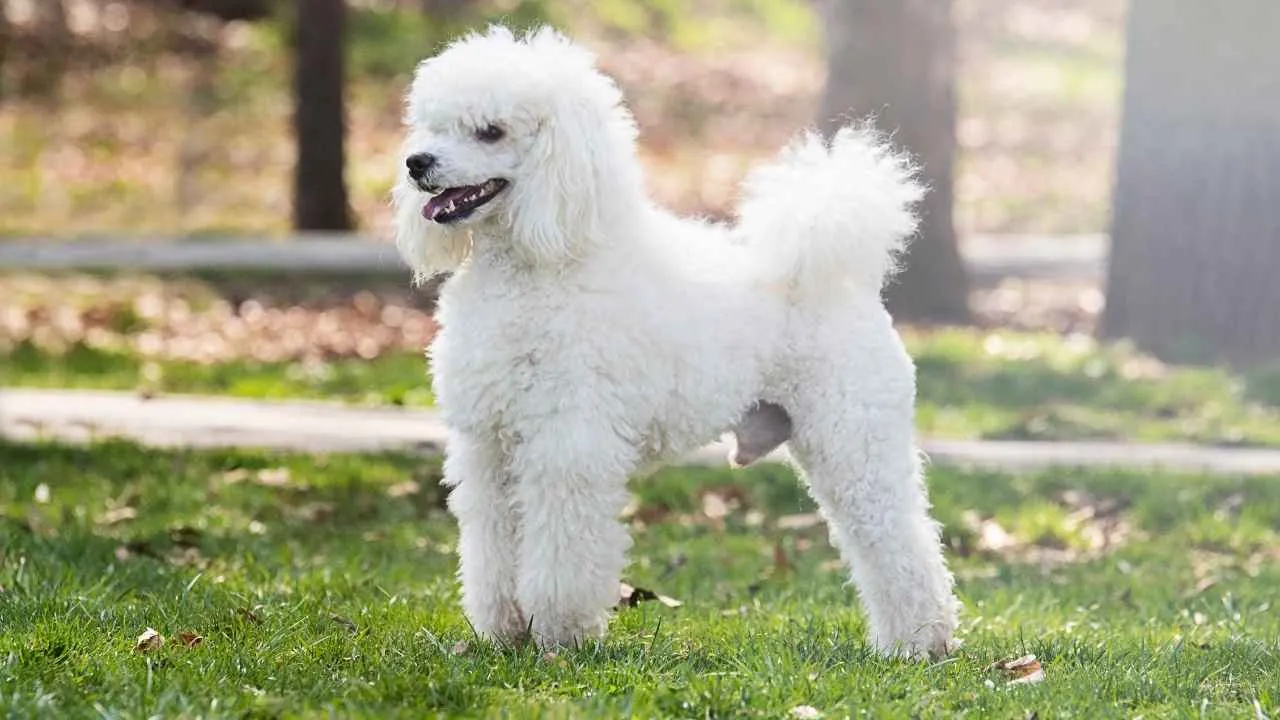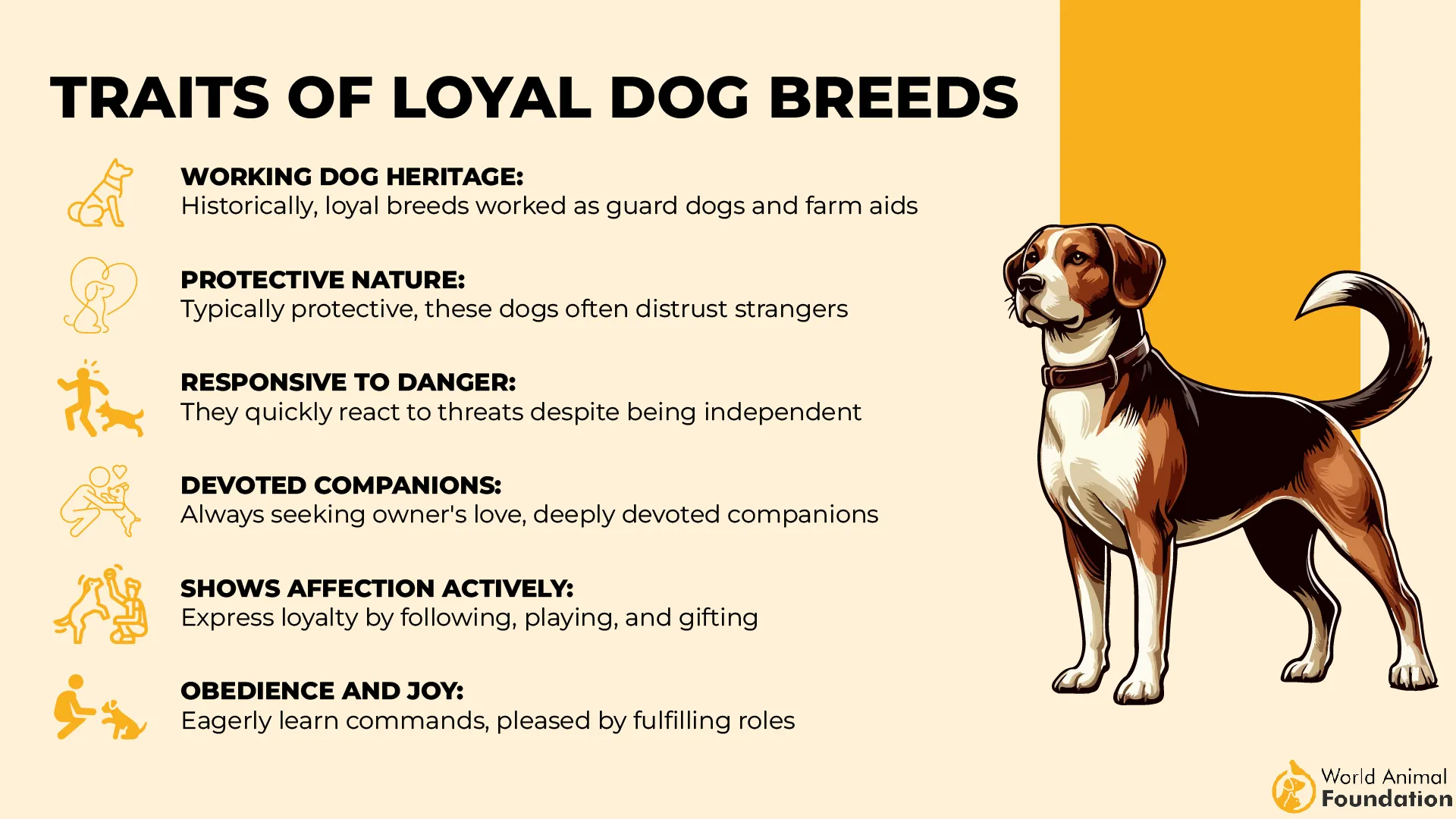WorldAnimalFoundation.org is reader-supported. When you buy through links on our site, we may earn an affiliate commission. Learn More
They say loyalty can’t be taught, but in the dog world, some breeds seem to be born with it hardwired into their DNA. Whether it’s their unshakable devotion, willingness to protect, or the way they never let you out of sight, loyal dogs bring a unique kind of connection to their human companions. For those seeking a dependable service dog, this bond isn’t just heartwarming; it’s essential.
While nearly every pup has the potential for loyalty, certain breeds stand out for their natural dedication to working closely with people. Many of these dogs hail from the American Kennel Club’s Working, Herding, and Sporting groups, where close cooperation and attentiveness were originally part of the job description. From guiding the visually impaired to detecting seizures or providing emotional support, these breeds have the brains, heart, and drive for the task.
Choosing a loyal service dog isn’t just about breed, it’s about finding a partner who’s eager to learn, emotionally in sync, and raised with purpose. In this article, we’ll explore the most devoted breeds that not only bond deeply but also possess the qualities that make them ideal service companions.
Loyal Service Dog Breeds
1. Labrador Retriever
When it comes to loyalty paired with a can-do attitude, the Labrador Retriever is a true standout in the service dog world. According to the AKC, Labs consistently top the list of service dog breeds thanks to their affable nature, eagerness to please, and exceptional trainability.
These dogs are naturally social but never overbearing. They strike a rare balance, being friendly enough for public settings and deeply devoted to their handler. That combination makes them ideal for individuals who need constant companionship and focused assistance.
Labs are also known for their physical capability. Their athletic build and energy allow them to keep pace during busy days and support physically demanding tasks like mobility assistance. Whether it’s retrieving dropped items or helping steady their human, Labs are up for the job.
But there’s more to Labs than brawn. They’re remarkably intelligent and love working through tasks, often learning commands quickly and responding eagerly. Their obedience isn’t just learned, it’s part of who they are.
What sets them apart further is their remarkable sense of smell. Trained Labs can detect everything from low blood sugar to seizures, even contributing to search-and-rescue and military efforts with precision and calm under pressure.
All these traits make Labrador Retrievers excellent candidates for roles like guide dogs, seizure-alert dogs, or even service dogs for veterans. They’re not just loyal, they’re lifesaving companions in fur.
2. German Shepherd
The German Shepherd has long set the gold standard for loyalty and service. In fact, they were among the first dogs trained as guide dogs back in the 1920s, a role they still excel at today thanks to their remarkable blend of smartness and dedication.
According to Britannica, this breed was developed in Germany from traditional herding dogs. They were built for work, both mentally and physically. With a muscular frame, sharp focus, and dense double coat, they’re equipped to handle everything from city streets to rugged rescue missions.
What truly sets the German Shepherd dog apart is their versatility. Their strong sense of duty allows them to take on roles ranging from guiding the visually impaired to assisting with mobility, detecting seizures, or supporting veterans with PTSD.
These popular service dog breeds are known for their unwavering focus, which is why they’re a favorite among police and military units worldwide. Whether tracking scents, locating survivors, or patrolling airports, GSDs perform with purpose and precision.
At home, their loyalty translates into deep bonds with their handlers. They are naturally protective yet gentle when properly socialized, making them not only hardworking service animals but also trustworthy family companions.
3. Bernese Mountain Dog
The Bernese Mountain Dog may look like a fluffy, oversized teddy bear, but behind those soulful eyes lies a hardworking, loyal service companion. Originally bred in the Swiss Alps for draft and droving work, these gentle giants are equipped with both strength and heart.
PetMD reports that Bernese Mountain Dogs were brought to the U.S. in the 1920s to serve as reliable farm hands, and while many now enjoy family life, their utility spirit remains strong. They’re powerful enough to offer mobility assistance and even help pull wheelchairs when needed.
Their calm and laid-back demeanor makes them particularly suited for people who benefit from emotional stability in a dog. They’re also trainable and intelligent, eager to perform tasks like retrieving dropped items or gently nudging their handler to safety.
One standout feature of the Bernese is their physical size, they can reach up to 115 pounds and stand nearly 28 inches tall. But don’t be intimidated; they’re known for their affectionate and deeply loyal nature, especially toward their inner circle.
While they’re warm and cuddly with loved ones, Berners tend to be a bit reserved with strangers. This reserved nature helps them stay focused when working in public spaces without being easily distracted.
With their tri-colored coats, kind expressions, and mellow energy, Bernese Mountain Dogs bring both visual warmth and functional support to the world of service dogs.
4. Poodle
When it comes to brains, beauty, and bounce, the Poodle checks all the boxes, and that’s exactly why they shine in service roles. Available in Standard, Miniature, and Toy sizes, there’s a Poodle to match various assistance needs, though the Standard Poodle is most commonly used for service work due to its ideal size and strength.
Poodles rank among the smartest dog breeds, which makes them fast learners and incredibly responsive to commands. This high trainability is paired with an eagerness to please, helping them master complex tasks like retrieving medication or alerting to alarms.
Originally bred for water retrieval, these excellent service dogs have an innate task-driven mindset. They thrive when given a job to do and possess the stamina and focus needed for daily service work. Their athleticism also makes them capable of navigating varied environments, from public transportation to open parks.
Despite some misconceptions, Poodles are incredibly adorable and social. They bond easily with their handlers and are friendly with others, an important trait for public-facing service dogs.
One standout feature is their low-allergen curly coat. Though it requires regular grooming, it sheds minimally, which can be beneficial for people with allergies.
Poodles also excel in environments that demand flexibility. They quickly adapt to noise, crowds, and changes in routine, making them reliable and versatile partners for many types of service needs. They are particularly good service dogs.
5. Golden Retriever
It’s hard not to smile when you see a Golden Retriever, and it turns out they’re just as good at working as they are at winning hearts. According to Purina, these sunny-natured dogs are among the most recognizable and universally adored breeds, known for their playful and outgoing nature.
Golden Retrievers were originally bred to retrieve waterfowl, and that job-focused background still shines through. They have a natural desire to fetch and carry, which translates beautifully into service dog roles that require object retrieval or task execution.
Their loyalty is unmatched. These dogs love to stay close to their people, often trailing them like a shadow. This makes them ideal for roles requiring constant presence, like guide work or emotional support tasks.
These emotional support animals also offer a balance of calm and enthusiasm. Their friendly temperament allows them to remain composed in public settings, yet their playful side ensures they engage enthusiastically when needed.
Size-wise, they’re just right, strong enough to assist with physical tasks, yet gentle in their approach. They can easily be trained to open doors, push buttons, and provide steady mobility support.
Add to that their famously dense golden coat and their adaptable, sociable nature, and it’s easy to see why they’re a top-tier choice in the world of great service dogs.
6. Boxer
If dogs had superhero alter egos, the Boxer would be rocking a cape. With their chiseled muscles and expressive, wrinkly brows, Boxers are the total package, brawn, brains, and a big ol’ heart to match. These stocky charmers are as powerful as they are muscular, as per Hills Pet, making them top contenders for loyal service dog work.
Originally bred for working roles, Boxers shine in everything from agility to drug detection. They’re like that friend who’s good at every sport without even trying. Service tasks? Check. Therapy visits? Easy. Search-and-rescue? They’re already out the door.
Underneath that athlete’s build is a goofball in disguise. These therapy dogs love to clown around but know exactly when to flip the switch into “serious mode” if duty calls. Their alertness and bravery make them fantastic watchdogs and fiercely loyal guardians.
And while their squishy brachycephalic faces give them an adorably stern look, don’t be fooled, they’re suckers for snuggles. Their natural patience and protective streak make them great with kids and devoted to their families.
Their short, sleek coats require minimal fuss, and their enthusiasm makes training both productive and fun (with a few wiggles in between). Early socialization ensures these family dogs channel their energetic spirit into becoming model citizens.
7. American Staffordshire Terrier
The American Staffordshire Terrier, often affectionately called the AmStaff, combines strength with an impressively loyal heart. Their solid, muscular build makes them an excellent candidate for mobility-related service dog tasks, but their potential doesn’t stop there.
According to WebMD, these dogs are known for their confidence, intelligence, and friendly nature. Their devotion to their humans is unmatched, making them incredibly dependable partners in various service roles.
AmStaffs originate from a mix of early terrier breeds and old-style bulldogs, a lineage that contributes to their determination and resilience. While their appearance can be imposing, their personalities are often warm and affectionate, especially when socialized well from a young age.
These terriers are quick learners with a strong desire to please, which makes training both effective and enjoyable. Their alertness and responsiveness make them particularly suited to tasks that require vigilance and attentiveness.
Despite their strength, AmStaffs are incredibly gentle with those they trust. With the right guidance, they can form deep, lasting bonds and show exceptional emotional awareness, traits ideal for emotional support or PTSD service roles.
Their sleek coat is easy to care for, and their steady temperament ensures they can adapt to both calm and dynamic environments. When properly trained, AmStaffs are true service superstars.
Conclusion
Choosing the right service dog is about more than just loyalty, it’s about matching the dog’s temperament, intelligence, and physical abilities to the unique needs of its handler. From the intelligent Labrador Retriever to the friendly Poodle, we’ve explored breeds known for excelling in service dog training and offering dependable support.
Whether assisting with mobility, acting as medical alert dogs, or providing emotional stability as a psychiatric service dog, these loyal companions play essential roles for people with physical or mental disabilities. While many purebred dogs are favored for their consistent traits, it’s important to remember that not all dogs, even within the same breed, will be suited to service work. Factors like socialization, individual personality, and early training are just as crucial.
And though often seen on agility fields, the brilliant Border Collie deserves mention for its smartness and trainability, qualities that could shine in specialized service roles. No matter the breed, a well-matched and properly trained dog can be a life-changing partner, offering independence, support, and unshakeable companionship.
